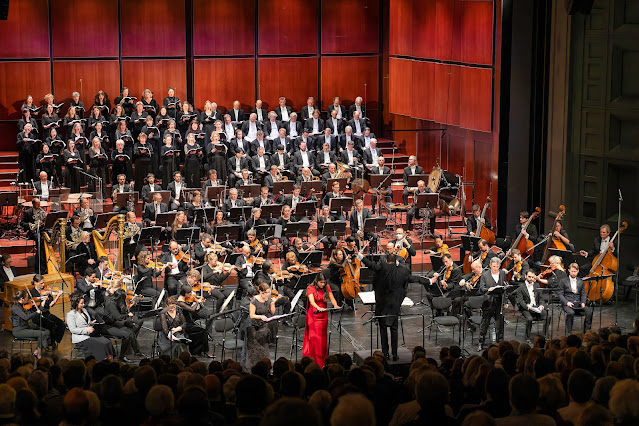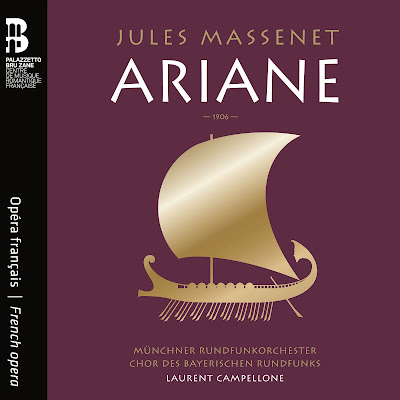Massenet: Ariane; Amina Edris, Kate Aldrich, Jean-François Borras, Jean-Sébastien Bou, Munchener Rundfunk Orchester, Laurent Campellone; Palazzetto Bru Zane
Returning to the Paris Opera after a gap of 12 years, Massenet created an opera full of wonderful things as the magician wove his magic yet with modern elements from Wagner and beyond. The result, in this terrific recording is by turns seductive and thrilling
We tend to think of Massenet's later career as focusing far less on grand opera. After Thais (1894) he had a run of operas at the Opéra-Comique and Monte Carlo Opéra including works that have currency in the modern opera house, Cendrillon, Chérubin and Don Quichotte. But in 1906, he made a return to the Paris Opera with Ariane to a libretto by Catulle Mendes. Ariane and its companion, Bacchus represent Massenet's final operas for the Paris Opera, and they show no reduction in scale or grandeur.
Massenet's Ariane has left almost no trace whatsoever in the recorded legacy so it is a pleasure to be able to welcome a magnificent new recording from Palazzetto Bru Zane with Laurent Campellone conducting the Munchener Rundfunk Orchester with Amina Edris as Ariane, Kate Aldrich as Phèdre, Jean-François Borras as Thésée and Jean-Sébastien Bou as Pirithoüs,
The opera is no small undertaking. The orchestra calls for triple woodwind, four horns, three trumpets, four trombones, tuba, two harps, timpani, four percussion and celeste! The opera is in five acts and is more of a Hollywood spectacular avant le lettre, the scenario encompassing a fight with the Minotaur, a ship on stage in the midst of a storm, and a recreation of the realm of Hades, not to mention the usual grand opera scenes of procession and assembly. After the premiere, an alternative staging was contrived for Nice but the opera was barely seen outside Paris, and its last major revival was at the Paris Opera in 1937 with Georges Thill.
The libretto is by the poet Catulle Mendes (who had written the libretto to Debussy's abortive Rodrigue et Chimène) and it expands considerably on the myth. Act One is on Crete, with the fight with the Minotaur, but Ariane has a sister, Phèdre, also in love with Thésée. This comes to a head in Act Two, during a storm at sea, but from then on Mendes adjusts the myth. Like Orpheus, Ariane descends into the Underworld (Act Four) to bring back Phèdre, who has died because she revolted against her love for Thésée (end of Act Three). Then Ariane lets her sister leave with Thésée before yielding to the call of the Sirens (Act Five).
To an extent, the opera is a response to Wagner. Massenet attempted something similar in Esclarmonde (1889) though not completely successfully. As with that work, there is a dense network of leitmotifs, an orchestra with a strong brass component and a predominantly declamatory vocal style. There are some twenty ‘reminiscence motifs’ (motifs de rappel) that Massenet uses to weave the orchestral texture. Declamation predominates, though occasionally there are arias and you feel Massenet pulled between his modern style and the seductive lyricism of his other operas. This is particularly true of the heroine, Ariane, who has moments where she seems to be in an earlier Massenet opera.
Ariane is a the more lyric role, but her sister, Phèdre, is a dramatic soprano, much given to declamatory outburst; unsurprising given she spends most of the opera as the third in an operatic love triangle. Thésée is much given to declamation, and we never really hear him in seductive duet with either of the women he is involved with. The fourth major figure is Pirithoüs, Thésée's friend. It is probably significant that the first Phèdre and Ariane were both noted Brünnhilde and Isolde. But not completely, every so often the textures relax and we find ourselves in the lyrical realm of the other Massenet.
The opening, with its rich orchestral palate and chorus of sirens, is richly seductive and Massenet's fingerprints are everywhere, but the long solo for Pirithoüs (Jean-Sébastien Bou) is declamatory and even Amina Edris's first solo as Ariane has a similar feel to it, but her second (sung to her sister) brings us to the sound world we know from Thais. Amina Edris makes a seductive Ariana, able to spin a vibrant line and float high notes, yet with the requisite power at the right moments. Jean-François Borras as Thésée gets his lyrical moment at the end of Act One with lovely, short solo.
In Act Two, their roles intertwine and Massenet's writing is lyrical without ever quite falling into the idea of an aria and though marked out, the opera flows closer to Wagner's continuous arioso than anything else. By Act Three, Thésée has moved from Ariane to her sister, the writing for him becomes more dramatic and Borras shows his mettle, like Edris he has a vein of steel in his voice.
Kate Aldrich as Phèdre has a more turbulent presence than Edris as her sister. From the outset, the writing for Phèdre deliberatly less lyrical more dramatic. Even in Act Three when Phèdre admits to Ariane that she is her rival, the duet is dramatic and it is Edris' Ariane who has lovely lyrical aria that follows, another one of those moments that echoes earlier Massenet operas. Then Phèdre has her moment and Aldrich is wonderfully turbulent here, moving the discourse firmly back into the 20th century. And Phèdre and Thésée do have a duet, it is anything but lyrical and both Borras and Aldrich grasp the dramatic opportunities, old-fashioned though they might feel at times.
Edris is wonderfully expressive in Ariane's long scene as she considers what has happened, long lines combining with orchestral drama. The emotional drama is matched by the on-stage as Phèdre dies and the end of Act Three is taken up with the ensuing events and funeral, including another expressively melancholy solo for Edris, who again shows how to spin lines.
By Act Four we are beginning to realise that for all the power of the drama, Mendes libretto sometimes rather over does things, expanding to fit the necessary five-act structure. Act Four is too substantial, and feels too much of an interruption, particularly as there is a fine solo role for Persephone (Julie Robard-Gendre). That said, Massenet's writing is wonderfully effective here.
By Act Five, Thésée is wallowing in grief with Borras in terrific form, supported by Bou. And the ensuing act is a fine piece of dramatic writing with Massenet mixing voices and orchestra into something like continuous drama. Borras and Aldrich go off into the sunset (on a boat) in a short scene that is highly effective and completely lacking the extended romantic moment we might have expected, whilst the ending very much belongs to Edris' as Ariane as she has long dramatic solo that opens with a completely unaccompanied vocal line. Edris is on terrific form here, and we are fascinated hearing Massenet moving into the 20th century whilst never quite leaving his 19th century persona behind.
Jean-Sébastien Bou's Pirithoüs is a major part, but one that is that of confidant and sensible voice. Bou plays the role admirably, matching Borras when needed as they move from lyricism to more dramatic writing. His main solo is his fine opening one, and thereafter he spends much of his air-time duetting, commenting and generally being sensible. Bou does this finely, and makes a vivid fourth presence on the disc.
Julie Robard-Gendre makes a fine, dramatic Perséphone, completely holding her own in Act Four. Whilst the smaller roles are all well taken with Marianne Croux as Eunoé and a Siren, plus Judith van Wanroij, Yoann Dubruque, and Philippe Estèphe in smaller roles.
But this opera's focus is on the principals, and on the orchestra. Even at the height of his 19th-century career, Massenet's operas were about the orchestra as much as the voices. A work like Werther requires first class orchestral playing. Ariane is the same, not just in the various moments where the orchestra comes to the fore, such as the tempest in Act Two, but throughout the orchestra is a major presence and voices interwine with instruments in a way which is, yes, Wagnerian even though the actual material might be anything but.
 |
| Massenet's Ariane in concert at the Prinzregenten Theater in Munich (Photo: Ralf Wilschewski) |
I can't imagine this opera getting a better debut on disc, and all the performers do far more than sing the notes. They believe in the work, and make us believe to. The musical world of Ariane is that of seductive drama. It is akin to Richard Strauss' Die Aegytische Helena but with better tunes and less screaming. We should perhaps remember that Massenet was only 64 when he wrote it, plenty of time for an old dog to display his new tricks. You rather regret that he didn't have a more forward looking libretto. As a poet, Mendes was associated with the Parnassian group and there are elements in this that point to symbolism, but the dramaturgy is too firmly wedded to the old fashioned five-act grand opera. You feel that a shorter, more modern version would have been more striking.
Yet, there is lots to enjoy and explore here, as we are by turns seduced and thrilled, engaged, yet wonder at the way Massenet draws the various threads together, 19th-century Romantic drama, Wagnerisme, and 20th-century drama.
Jules Massenet (1842-1912) Ariane (1906)
Amina Edris - Ariane
Kate Aldrich - Phèdre
Jean-François Borras - Thésée
Jean-Sébastien Bou - Pirithoüs
Julie Robard-Gendre - Perséphone
Marianne Croux - Eunoé, a Siren
Judith van Wanroij - Chromis, Cypris, a Siren
Yoann Dubruque - Ship's Captain, Sailor
Philippe Estèphe - Phereklos, Sailor
Munchener Rundfunk Orchester
Laurent Campellone (conductor)
Recorded in the Prinzregenten Theater, Munich, 27 & 29 January 2023
PALAZZETTO BRU ZANE BZ1053 3CDs [58:38, 56:26, 48:17]
Never miss out on future posts by following us
The blog is free, but I'd be delighted if you were to show your appreciation by buying me a coffee.
Elsewhere on this blog
- Musical pleasure: strong & stylish performances from a young cast in English Touring Opera's new production of Rossini's La Cenerentola (Cinderella) - opera review
- Astonishing that no-one has heard or heard of the work: Ella Marchment on directing Camille Erlanger's L'Aube rouge at Wexford - interview
- The flower fairies are back: Cal McCrystal's production of Gilbert & Sullivan's Iolanthe for ENO fills the London Coliseum with colour, movement & comedy - opera review
- Up Close & Stormy: Lucy Schaufer launches Up Close & Musical 2023 at the Fidelio Cafe - concert review
- Offenbach's La princesse de Trébizonde from Opera Rara performed with wit & style, you can't help but be drawn in & have as much fun as the performers - record review
- A 3D, surround sound, high definition Vespers for the 21st Century: Monteverdi's Vespers of 1610 from I Fagiolini at Kings Place - concert review
- Modernising Monteverdi: The Coronation of Poppea from English Touring Opera in a radical new version by Yshani Perinpanayagam - opera review
- The 1930s sextet: contrasting works from Dohnanyi and Poulenc at the heart of Kaleidoscope Chamber Collective and Orsino Winds collaborative concert - concert review
- The sheer delight of playing together: Ben Goldscheider & friends in Brahms, Schumann & Joseph Phibbs premiere at Hatfield House - concert review
- What is essential is that you have to be passionate about the work: Canadian baritone Étienne Dupuis, Don Carlo in the Royal Opera's revival of La Forza del Destino on his clutch of Verdi roles - interview
- Three more gems: British Piano Concertos from Simon Callaghan & BBC National Orchestra of Wales - record review
- Home












No comments:
Post a Comment